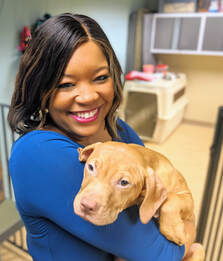 Living the dream...until suddenly I wasn't. Living the dream...until suddenly I wasn't. If I’m honest, I hadn’t been happy in my reporting job for a while. From the outside, it looked like I was having the time of my life. I was often leading the top story for the highest-rated newscast at CBS San Francisco. Switch on your television on any given night, and you could find me reporting from Barack Obama’s My Brother’s Keeper conference, interviewing some of the best basketball players in the NBA, hosting my own show, or creating the first documentary of its kind on racial justice. Outside of the newsroom, I was teaching a journalism class at UC Berkeley and serving as Vice President of Broadcast on the board of the Bay Area Black Journalists Association. It was exhilarating and important work, but I couldn’t escape the feeling that this juggling act was my way of trying to escape a creeping, uncomfortable reality: I had hit a wall in my professional life. Covering the city of Oakland for CBS San Francisco had been my dream job, but eight years in, I felt I had learned everything I could. I found myself depleted, disinterested, and desperately craving a change of scene. The problem was I had developed deep roots in the Bay Area. I forged trusted relationships with city officials and other sources. I met my husband in the Bay Area, formed new friendships, and developed a closer bond with my sister, who was just a short drive away. But establishing roots is tricky business. The deeper they grow, the more difficult it becomes to extricate yourself, to stay mobile, to shake things up. I had fallen into the trap of stagnant safety. My closest friend had been actively trying to lure me to the Pacific Northwest for more than a decade. My interest was always half-hearted, my resistance grounded firmly in family history. I’m a sixth-generation Californian. My ancestors moved to the Bay Area as slaves during the gold rush. It was in California that they became free and founded a church that still stands in San Jose. Becoming Californians was not geographical happenstance for my ancestors. It was essential for survival as the Civil War raged on. More than a century later, California became my birthright. But the Pacific Northwest was tugging on me. When one of my favorite bosses left San Francisco to become the head of the NBC station in Seattle, I took a deep breath and reached out. Within weeks, I was being offered a reporting job. I can’t say I didn’t have reservations. I grew up in Sacramento’s arid summer heat. Like most Californians, I hear the word Seattle and it conjures up images of stormy weather and year-round gloom. To be fair, within months, I was faced with the city’s rainiest day in a decade. In February, it rained almost every day of the month. During one live shot, I struggled to see and speak as gusty wind blew a blast of torrential rain into my eyes, nose and mouth. But more often than not, the rain comes, pleasant and perfunctory, and passes on. I find myself studying the skies in a way I never have—marveling at complex cloud formations, at once heavy and buoyant, mammoth and meditative. I watch a slice of the Puget Sound from my living room—choppy one day, placid the next, the surface of the waters broken briefly by barges or, when the season is right, the odd Orca. Sun breaks come quickly and unpredictably and engender an appreciation that I never had when they were the norm. It is quiet here. Trees are stately and green, overrun with cherry blossoms or apples that grow wild as weeds. Bald eagles flock like seagulls to vacant beaches. They perch casually on washed-up driftwood, their presence at once majestic and mundane. The sky is ever-changing, the clouds restless and reshuffling by the moment, overlapping then withdrawing to expose mountain ranges here, an awe-inspiring volcano there. As journalists, we are taught to eschew editorializing or opinion, to elevate fact above all else. It can be difficult to abandon rationality and tap into what we know to be true inside. I have no data to prove that coming to Washington was the right move. Uprooting left me uncertain and exposed, but I have discovered beauty in the unknown. Like a plant pulled from soil, I’ve shaken off what was holding me back. I’ve replanted. I’ve opened up, and I find myself growing again.
1 Comment
 I met Sweetness less than a month after my husband and I put down our beautiful white pit bull, Luna. Luna was a force who fought cancer for months before falling asleep for the last time in February. Sweetness was also a fighter, a 13-week old camel-colored pit bull puppy rescued from an alleged dog-fighting ring last December. I had been covering the story for weeks. Twice I had conducted brief, chaotic interviews with Sweetness' owner, who Animal Control officers were investigating for allegedly breeding and fighting dogs. Twice, surrounded by news cameras and protesters, he flatly denied abusing Sweetness or any of the roughly 50 pit bulls he owned. But a Pierce County judge ruled that he could not keep the dogs. It was after the judge's ruling that I finally got to meet Sweetness at the Humane Society of Tacoma and Pierce County, her new home. I had seen only one horrifying picture of her before we met, snapped by an Animal Control officer on the day her owner's home was raided. In the photograph, at just five weeks old, she is emaciated, her ribs protruding. The small, sleepy, pink-bellied puppy who greeted me at the humane society seemed like an entirely different dog. When I scooped her up, she curled into a crescent and practically dozed in my arms. I have been admittedly sensitive around dogs since losing Luna, but Sweetness lived up to her name. I wondered how long she was underfed in her short life. I wanted so badly to bring her home. Every dog owner has a different way of grieving when their pup passes. We chose not to save Luna's ashes after she was cremated, but I commissioned an artist to paint a small portrait of her. Some people choose to quickly bring a new dog into the family. Others wait years. As much as I wanted Sweetness, I also wanted to honor Luna's memory for as long as possible without replacing her. She deserved that. My husband and I deserved to take the time to fully feel our loss. I held Sweetness in my live shot, enjoying the feel of her fur, soft as suede. When I gave her back, my heart broke a little. I was torn, wanting to help her, unsure if it was the right time. A few day later, the communications manager of the Humane Society reached out to ask if I was interested in taking Sweetness. I told her my husband and I had decided it wasn't the right time. What she wrote back stuck with me: "Thanks to your coverage, we've gotten a ton of interest, especially in the puppies. Even though it's not through adoption, in a very special way, you've helped change Sweetness' life and her siblings' lives for the better." I had forgotten that there is more than one way to help, that it could be possible to grieve Luna and help Sweetness at the same time. It reminds me of saying I've heard all my life: Sometimes you have to take the bitter with the sweet(ness). |
AuthorChristin Ayers is a Seattle-based journalist, content creator, and lover of words and wine. ArchivesCategories |
 RSS Feed
RSS Feed
